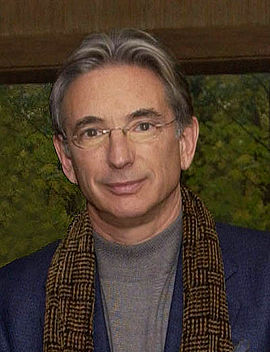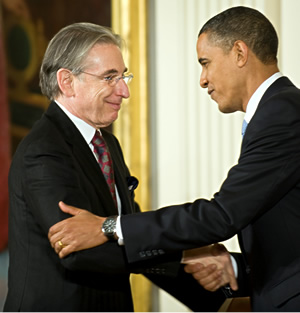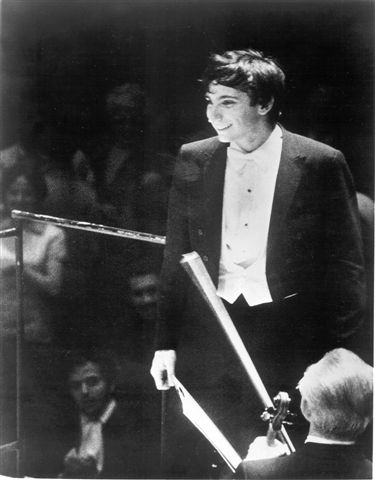A busy Michael Tilson Thomas keeps his focus on the music

A precocious music-loving 9-year-old boy wrote a letter to Michael Tilson Thomas after hearing him lead the San Francisco Symphony in a concert of Gershwin. To the boy’s surprise, the famous conductor answered.
“I am very glad that you liked our music,” Tilson Thomas wrote. “It sounds like you are already quite an experienced musician. Obviously Mozart and Beethoven are big favorites of yours. Have you listened to any 20th Century composers, like Stravinsky or Prokofiev or Bartok? Stravinsky’s Petrushka was one of my favorite pieces when I was your age. I think you would like it too.”
It was classic Tilson Thomas, taking a young person’s aspirations seriously while nudging him toward more challenging repertoire.
That boy, Teddy Abrams, is now 23 and the conducting fellow of the New World Symphony, the training orchestra Tilson Thomas founded in Miami Beach to provide a sort of finishing school to top conservatory graduates. “This was the first time I communicated with Michael, and it really inspired me,” said Abrams. “He always found time for me. I didn’t realize how generous he was.”
Tilson Thomas, who led a memorable Stravinsky program here last season, returns this week to lead the Chicago Symphony Orchestra an all-Copland program containing Appalachian Spring, Quiet CIty, the Orchestral Variations and the Symphony No. 1 with organist Paul Jacobs. (The performances at 8 p.m. Thursday-Saturday will be preceded by a free organ recial by Jacobs at 6:30 p.m.)
It has been a good year for Tilson Thomas. His recording of Mahler’s Symphony No. 8 and the Adagio from Symphony No. 10 won three Grammy awards, capping his acclaimed San Francisco Symphony cycle of the composer’s symphonies. He went to Washington to accept the National Medal of Arts from President Obama (“Dylan, Eastwood get White House awards,” read the Associated Press headline.) He gave a smash Mahler performance with the Boston Symphony at Tanglewood as a replacement for the ailing James Levine, generating talk that he is first in line as Levine’s successor.
And this January he looks forward to inaugurating the New World Symphony’s new Frank Gehry-designed hall in Miami Beach, a campus that doesn’t just accommodate modern technology but embraces it, with video screens, Internet hookups and moveable stages that give the orchestra the chance to break the mold of the traditional 19th-century concert experience.
“The experience of attending these events will be more like going to a gallery opening, where you’ll kind of know something is happening,” he said. “The building itself and the park will be a kind of destination, and you’ll be down there to appreciate everything that’s happening in the emerging arts district of Miami Beach. This will be a prototype for exploring the nature of concert events for the future, not just for Florida but for the whole world.”
Tilson Thomas divides his time between Miami Beach and San Francisco where he is in his 15th year as music director of that city’s orchestra. He and his partner and manager Joshua Robison own a four-bedroom, stucco house on Miami Beach’s North Bay Road, where a row of multimillion-dollar homes face the water.
The conductor’s routine is austere. He rises at 7 a.m. and works out on a treadmill or elliptical trainer. He breakfasts on kasha–an Eastern European buckwheat dish, which he says reflects his Ukrainian-Jewish roots–with fruit, yogurt and a sprinkling of cardamom. He arrives at the Lincoln Theatre a bit after 9 a.m. and embarks on a round of meetings, rehearsals, emails and sessions with individual fellows. He usually has a salad delivered to the theater for a working lunch.
Asked what he does for fun in Miami Beach, one of the world’s great social playgrounds and pleasure domes, he said, “Well, all this is fun. I’m very blessed that work is very challenging for me but it is really–most of the time–fun.
“The process of studying the music itself and working with people, particularly young people, in exploring what it’s all about, connecting the past, the present and the future through the spirits of the musicians involved in making the music–I’m very passionate about that.”

At the Lincoln Theatre, he is a formidable figure. With the casual authority of a 19th century British sea captain, he claims the privilege of bringing along pets, taking his poodles Sheyna and Banda to the orchestra’s offices. The fellows, as the orchestra’s young musicians are known, call him Michael or MTT, but the familiarity ends there.
“It’s definitely not the type of relationship where just a couple of fellows will go out to dinner with him,” said Kari Kistler, an oboist from Reston, Virgina. “It’s more a teacher and student relationship. But at the same time, he is personable and approachable.”
What they value most, she said, is working with one of the leading musicians in the United States, a conductor of enormous musical and intellectual intensity, who knows how to express musical ideas and turn them into reality on the concert stage. Last season, she said, when they were preparing a mini-Debussy festival, including La Mer and Prelude to the Afternoon of a Faun, he had the young players focus deeply on the composer’s late orchestral work Jeux.
“This piece is not played as often as La Mer,” she said. “Jeux was, as Michael put it, much more sophisticated. Little things, like the flute line that has to come out, or the trumpet. We really have to bring out the musical elements to help the audience connect to the piece.”
Jeremy Denk, the New York pianist who has performed concertos of Copland, Feldman, Mozart and Beethoven with Tilson Thomas in Miami Beach and San Francisco, said the conductor brings a relentless, probing energy to rehearsals, forcing himself and the other musicians to approach well-known works such as Beethoven’s First Piano Concerto as if they were new.
“I remember him being very particular about certain things in the Beethoven, a very simple couple of phrases at the beginning, which in a way are kind of throwaway phrases,” he said. “And Michael was very insistent that I wasn’t paying attention to them carefully enough, somehow the way that I was careless, and he was trying to get me to hear what he was hearing. It was a little bit maddening, and wonderful.”
“He’s the quickest mind I’ve ever been around. and that’s in a way terrifying in terms of you see him processing, you feel him processing information, vast amounts of it all the time, and making lightning connections, much faster than you could make them,” Denk said. “It’s an intense thing to be around, and also very inspiring, of course.”

Speculation about Tilson Thomas’ future arose this summer at Tanglewood after he replaced Levine for Mahler’s Resurrection Symphony, a performance that won enormous critical praise. “This summer’s roster of guest conductors, starting with Michael Tilson Thomas of the San Francisco Symphony, could serve as a recruitment service for Levine’s replacement,” said an editorial in the Boston Globe. A headline in the Berkshire Eagle put it this way: “MTT: Is he the one to replace Levine?”
Anthony Tommasini, chief critic of the New York Times, praised Tilson Thomas’ “incisive, engrossing and triumphant performance” and went on: “Unfair as it may have been, it was impossible to avoid comparing the ageless, vibrant Mr. Thomas with the ailing, absent Mr. Levine. The two are close in age. At 65, Mr. Thomas is still limber, trim and kinetic. Although his youthful energy enlivens his conducting, his music making is driven by deep insight, commanding technique and decades of experience.”
In many ways, capping his career by returning to Boston would make a graceful coming full circle since it was with the Boston Symphony that he began as assistant conductor and, later, principal guest conductor from 1969-1974 (then billed as “Mike Thomas”). Asked whether he would consider the Boston podium if offered, Tilson Thomas said, “I’m very happy where I am in San Francisco. We’ve recently been on a European tour, which was spectacularly successful. I have a very deep understanding and relationship with these musicians and I have no plans to go anywhere else.”
A highly anticipated concert this year in Miami Beach will take place next spring (April 30 and May 1) when Tilson Thomas leads the New World in Mahler’s Symphony No. 6, giving South Florida the chance to hear one of the world’s great Mahler specialists in one of the composer’s less frequently heard symphonies. Their performance last year of the popular Fifth Symphony, a vast and complex work that Tilson Thomas conducted without a score, was one of the great concerts of the season.
Tilson Thomas said he is drawn to the challenge and complexity of Mahler’s music, as well as its roots in the eastern European world from which his own family came. “It makes enormous demands on performers to really exhibit a whole range of playing, a whole range of emotional commitment, a whole range of character, not only beautiful things, but grotesque and parodistic and angry things,” he said. “The performance has to be very, very organized, and all the bits and pieces have to make a coherent, rich shape.
“There’s a very strong reference in Mahler’s work to elements of village music, in terms of the song and dance forms, in terms of a very specific mordancy that the phrases have. And I think I recognize a lot of that sort of tradition in the music and in myself and in the music I heard as a kid. On all these levels I feel very at home inside this music.”
Asked if there are any composers of which he’s had enough, he doesn’t hedge. “One composer I performed a lot at one time was Messiaen. And I’m not really doing much anymore. I think I came to understand the music very well, exactly how it should be. And I think what attracts me to come back to a lot of music is a mysterious element in it, that no matter how many times you’ve done it, it still is posing questions and making demands of you. . . . And with this music I did understand how it was supposed to go, and therefore wanted to leave it to other people. I know it’s very spectacular, and I used to love doing it, but it means less to me today.”
Asked his favorite composer today, Tilson Thomas gives another forthright answer: Schubert. “He has an amazingly fresh understanding of traditional harmony, which after these hundreds of years remains startling and wonderful,” he said.
In one of the New World Symphony’s ventures into alternative concert formats this season in the new space, the orchestra will devote one of its “Journey” concerts to Schubert, taking advantage of the new hall’s versatility to seamlessly alternate symphonic, vocal, choral and piano works from various stages within the hall.
“Schubert does very good things for me, to work on his music, to think about his music,” Tilson Thomas said. “I find it very comforting and civilizing. It’s very sincere music–you focus in on the most generous and selfless side of what it is to be a musician.”
Michael Tilson Thomas leads the Chicago Symphony Orchestra in Copland’s Appalachian Spring, Quiet City, Orchestral Variations, and Symphony No. 1 with organist Paul Jacobs 8 p.m. Thursday, Friday and Saturday. Jacobs will also offer a free organ recital at 6:30 p.m. preceding each concert with works of Bach, Brahms and Reger. cso.org; 312-294-3000.
Posted in Articles



Posted Nov 03, 2010 at 10:11 am by Glenn Richter
David Fleshler:
Thank you , thank you, and thank you greatly for this wonderfull article and your interview with Michael Tilson Thomas!!! I really, really liked this greatly. You have truly captured the spirit of the man. Last season with the Stravinsky evening and the Pulcinella performance I was in seventh heaven. The season before or so when he performed the Shostakovich Fifth was also memorable. I remember first hearing and seeing him conduct in the early 70’s at Ravinia after I first went there. I remember some great Wagner excerpts from Goetterdamerung. I cannot wait for tomorrow night’s concert after reading your article.
Thank you again and thanks yet to Larry Johnson for this terrific website. What he has done here is a great treat and great information for all Chicago music lovers.
Glenn Richter
Posted Nov 05, 2010 at 1:51 pm by Paul
For the same reasons given by MTT, Schubert is my favorite composer, too.